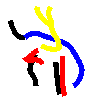|
A few miles farther they stopped for a drink to water the horses at a clear flowing stream.
"Now this is called The Chickasaw," he remarked. "Had a wagon load of stuff ambushed right here about ten years ago. But when them Indians found out it was for old Charlie Murray instead of the Army, they just beat it back into the woods. Never did find out who they were. The hostler was too scared and the redskins was too embarrassed to ever admit it. Always treated 'em fair and square, gave 'em good trade for furs and beeswax and another thing, I never sold 'em enough likker to get too drunk on. Drunk Indians is no good. First they holler an' laugh an'sing; then ker-pow they start fighten'. A drunk Indian ain't afraid of nothen'." A little before noon, Houston pulled up short. "Hey, Mr. Murray!" he called out. "Here's some wagon tracks cutting right across ours. Where do they come from - or to?" "Greenville Treaty Line. Runs from the Fort at Recovery right through here to the Old fort at Loramie, then goes off east someplace. Look at that red oak there. See that blaze about six feet up? That's the line - cut through here in 1796 right after the big signin' at Greenville. Those were wild and wooly days, believe you me." "You mean that from here on we're in white man's country? " McCorkle cut in. "Yep," stated the older man, "but it's all white man's country now-either side of that line." "Anyway, I feel better now. I've heard so much about the red devils, it kinda scares me. But you lived with 'em Murray, were you at Greene Ville then?" "Lordy no ! I was at my place all that summer-Saint Marys-but everybody called it Girty's town then. Busy as a bee in a berry patch! Those Indians all wanted to look their best when they met 'Kitcho Sheniagana' which is what they called Wayne. That's Shawnee for 'who sleeps with his eyes open'. I sold 'em brass buttons, six for a beaver, ten for a deer skin and twelve for a bear skin! Had to send clean to Dayton for more! Sold 'em copper rings, bracelets and bells, some silver stuff to the chiefs and beads by the boxes! And their squaws, did they ever buy me out of yard goods! Two of them got into a fight over my red and white wool shirt. I just whacked it in two and sold them each a half ! Yep, I had 'em all that year, from the Cuyahogas of northeast Ohio to the Ojebwas and Ottowas in Michigan-good summer! Those that didn't come for the signing came for the Pow Wow-lndians love to Pow-Wow!" |

After crossing the Treaty Line, the forest was broken by the scattered clearing of a settler. Long before they reached each homestead, the silence of the wilderness was broken by the barking of dogs who sensed that some stranger was approaching. By the time the riders broke into the open, the farmer and his wife were usually standing in the cabin doorway with loaded muskets, the ox team having been quickly unhitched from the plow was tied up close at hand. one couldn't be sure in those days who might be passing by. However, as the trio approached and were recognized as friendly, an invitation to "come and sit a spell" was universally extended. With each plot of newly broken ground, the pathway beneath them became a little wider and more smoothly worn. Some of the marshy spots had had brush cut and laid like a pattern of cloth to keep the wagons from sinking hub deep in the mire. Soon they came to a trail leading off to the side. Murray swung his horse into the lightly trodden way. Calling over his shoulder he told the other two, "Fellow named Silas Atchison laid out a town just a ways over here. I'd like to see how he's doin' with his place. Calls it Jacksonville, I hear, but I just can't see much future. No transportation, no river, no road to speak of either to Greenville-which isn't much-or to Piqua over on the river." Murray's prediction proved to be quite true. Later renamed Versailles, the town languished until the "Big Four" railroad provided the transportation needed. Sixty years later the village had grown to about a thousand population, and after a hundred and fifty years had become one of the nation's largest poultry and egg centers with the produce going out over a network of fine highways to the cities of America. |
|
5
previous page |
6
next page |



virtual St. Marys, Ohio
© 1999 ridertown.com
Aloha